The future looks bright for meat and dairy alternatives
1. Plant-based will become a £1bn category by 2026
2. One in five young adults in the UK do not eat meat
3. Consumers want vegan products that taste like their meat- and dairy-based counterparts
4. Plant-based savoury pastry sales are up by nearly two thirds
5. Delivery shoppers are 10% more likely to be flexitarian
6. Sales of frozen veggie options are set to rise
7. Growth will continue despite the cost-of-living crisis
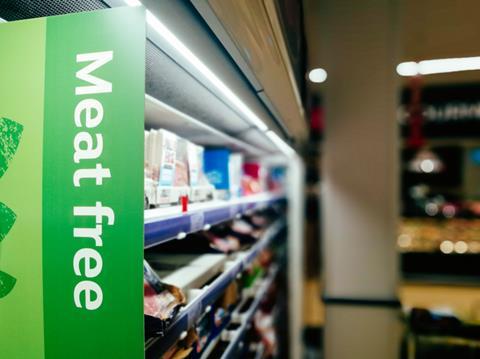
1. Plant-based will become a £1bn category by 2026
Don’t let the 3.7% slide in sales of plant-based meat alternatives (Nielsen) or dairy alternatives’ 0.2% dip (Nielsen) fool you – demand for vegan and vegetarian foods is still strong.
The declines are chiefly down to unflattering year-on-year comparisons with booming sales during lockdown, of course. Expectations are still high for the category. Indeed, Richmond owner Pilgrim’s Food Masters expects market value to surge by 74% to £998m by 2026.
“The plant-based category has been on an unbelievable growth trajectory over the last five years or so but it’s still a relatively small sector of overall FMCG sales,” said Pilgrim’s marketing director Dawn Spencer earlier this year.
“This means there is still vast headroom for further growth. Plant-based alternatives can no longer be an afterthought, so retailers need to ensure they are investing in a robust plant-based offering which stretches across different categories.”
But what does this mean for convenience retailers that often cater for change-averse customers have limited space for fancy new products?
For Sophie Williams, who runs Premier Broadway Convenience Store in Oxgangs, Edinburgh, with parents Linda and Dennis, plant-based and vegetarian products sell particularly well through her food to go counter. “Our fresh food – sandwiches, rolls, pasta pots and hot soups – always has a high number of vegetarian products,” she says.
“We often find that this is a good way of getting people to eat meat-free without them even realising it. For example, when we do hot lentil soup it always sells well with builders who come in for something hot and filling but wouldn’t normally eat vegetarian things.”

2. One in five young adults in the UK do not eat meat
It’s crucial to know your clientele. Suddenly swapping half your pork sausages for pea protein alternatives could leave you having to slash prices to sell off excess stock. Equally, not having the right milk alternative in stock could lose you valuable sales.
Striking a balance is key. “It can be tricky because where we live our clientele is not super vegan but there’s definitely growing demand for vegetarian and plant-based foods,” says Sophie.
“I’m interested in having alternatives in my own diet and we are trying to drag the community along with us. Generally, it’s younger people in their 20s and 30s who buy more of these products, especially young mums. Older people tend to stick with what they know.”
Sophie’s experience tallies with research into market demographics. YouGov research carried out in December 2021 found that almost one in five (19%) 18 to 24-year-olds do not eat meat – 5% are vegan; 10% are vegetarian and 4% are pescatarian.
A further 20% of young people identify as “flexitarian” – meaning they only eat meat occasionally – compared to 16% of the general population. The number of 18 to 24-year-old flexitarians has doubled since 2019 and for the general population its risen from 13%.
Women, millennials and high-earners are more likely to consume plant-based alternatives (Alae-Carew et al). This suggests that retailers in affluent areas with high numbers of young people – particularly students – will benefit from stocking more of these products.
“Our plant-based foods sell very well in the summer when we have lots of tourists visiting from cities but outside of the holiday season it really falls off,” says Hazel Ridge, who manages Bassett’s Londis in the Dorset seaside town Weymouth.
“I will be bringing back our plant-based range next summer when there are more people here. Vegan burgers sell particularly well during the barbecue season, but I think that’s mainly for tourists. I’ve lived in Weymouth for 10 years and I only know one vegetarian.”
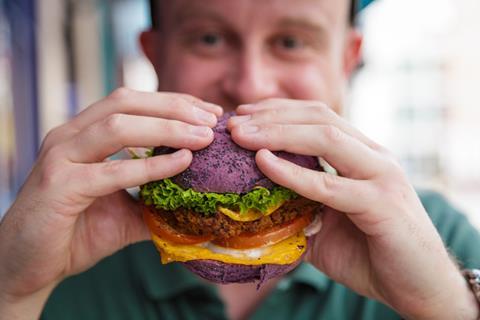
3. Consumers want vegan products that taste like their meat- and dairy-based counterparts
But what to stock? Plant-based milk alternatives are the most consumed vegan products, with 26% of the population consuming it at least once a week; 24% consume plant-based beef and 23% plant-based chicken (ProVeg International).
“We stock a wide range of Alpro plant-based milks – soya, almond, oat and sometimes coconut,” says Sophie in Oxgangs. “We’ve also been trialling a plant-based double cream from Elmlea which has been selling very well. I think it’s because it tastes like real cream.”
Tasting just like the real thing is key, says Hazel in Weymouth. “We do have some plant-based products that continue to sell well throughout the year,” she says. “I have customers that come in especially for the Wicked Porridge Pots because they are gluten-free.”
Another plant-based product has also proven popular for Hazel: microwaveable burger brand Rustlers’ Meatless Maverick. “I have a few customers who picked these up not realising they were meat-free, but they keep coming back for more,” she says.
“At the end of the day, I think that taste is always the most important thing. If people like the taste of something they will keep on buying it. If we all had to go vegan tomorrow, it would be the products that taste most like meat that would do best.”
The same can be said for plant-based sweet snacks, says Ben Mckechnie, MD of healthy snacks wholesales Epicurium. “We’re seeing an ever-increasing demand for plant-based snacks and shoppers are still keen to choose naturally plant-based options,” he says. “The biggest trends have been for plant-based versions of long-held favourites like the LoveRaw tribute to Kinder Bueno and Ferrero Rocher. Most of our range is plant-based and we’re always keen to offer the latest innovations. Plant-based chocolates and confectionery are now often indistinguishable – if not better than – their incumbent options.”
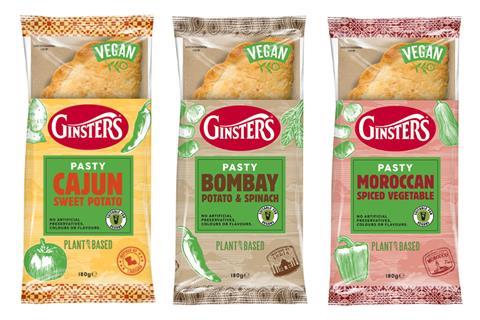
4. Plant-based savoury pastry sales are up by nearly two thirds
Ginsters – Britain’s bestselling savoury pastries brand – says that sales of vegetarian and vegan savoury pastries are also booming. “The vegan segment within the Savoury Pastry category has grown 61.7%,” says MD Sam Mitchell, citing Kantar 52 w/e 1 February 2022.
“Our innovative plant-based range now includes three flavourful pasties – Bombay Potato & Spinach, Moroccan Spiced Vegetable and Vegan Quorn. This progression enhances the overall relevance and visibility of the category to consumers looking for dietary variations.”
Of course, the demographics of the community you serve will play a big part in how well such innovations are received. Down in Weymouth, Hazel is not convinced about the long-term potential for such products for her clientele.
“The Ginsters vegan pasties and their Mac n Cheese Bake were some of the things that were selling well during the summer but now I have had to take them out,” she says. “They just kept ending up in the chilled reduced sections.”

5. Delivery shoppers are 10% more likely to be flexitarian
It’s not just where you’re selling that will determine demand for plant-based and vegetarian options. How you are selling also has an impact. According to Lumina Intelligence, shoppers who use delivery services are 10% more likely to be flexitarian than in-store shoppers.
“C-store retailers can increase the attractiveness of delivery services by ensuring ranging caters to different dietary requirements,” says Lumina Intelligence content marketing manager Monica Rico Castrillo.
“Delivered shoppers are 10% more likely to be flexitarian and 2% more likely to be dairy-free. They align with health-led values, creating an opportunity for c-store retailers to offer healthier options that are highlighted and easy to find on delivery platforms.”
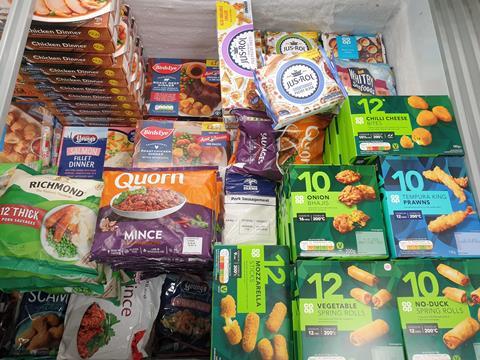
6. Sales of frozen veggie options are set to rise
With many shoppers feeling the pinch from the deepening cost-of-living crisis, frozen vegetarian and plant-based options are gathering pace in the convenience sector. In Weymouth, Bassett’s Londis is taking advantage of Tesco-Booker exclusives to capitalise on this, with Hazel using vegan shelf edge stripping to make her Wicked frozen ready meals range stand out.
Quorn Foods marketing director Gill Riley expects sales of frozen food to do well in the coming months as the economic climate darkens. “We know from previous recessionary times that shoppers turn to frozen foods when seeking value for money,” she says.
“Frozen has seen tremendous growth in previous years as it fulfils many shopper needs: value for money, reduced waste, convenience and ‘locked in’ freshness that lasts longer. Quorn’s core frozen range of Sausages, Mince, Pieces and Nuggets are all available in our standard range and ‘Big Bag Great Value’ range.”

7. Growth will continue despite the cost-of-living crisis
Some may question the long-term prospects of products that often carry a significant premium over non-vegan lines, given the clouds gathering over the UK economy. But Mckechnie at Epicurium agrees with Pilgrim’s assessment that sales will continue to grow.
“Cost of living is right at the front of mind across the market – however, it doesn’t always mean shoppers are trading down or choosing the lowest cost,” he says, adding that demand for health, indulgence and products with sustainability credentials will remain.
“Shoppers still want the brands that suit their lifestyle. When times get tough, they’re choosier about where they spend their pound, but that choice is often more about cutting out the things they’re ambivalent about so they can keep on buying their favourite brands.”
















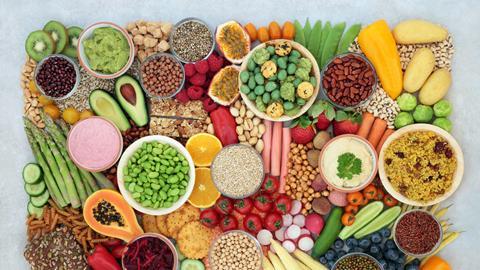
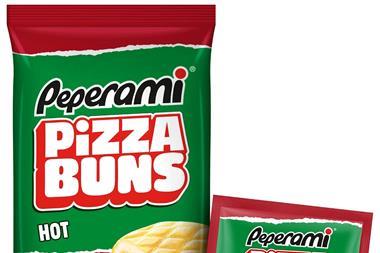
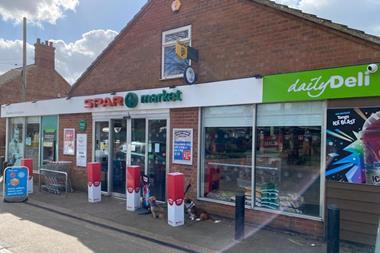


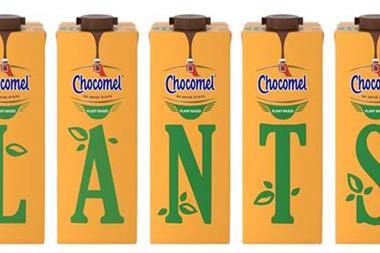
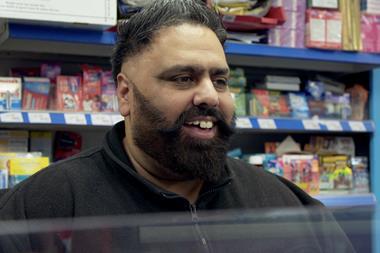






No comments yet